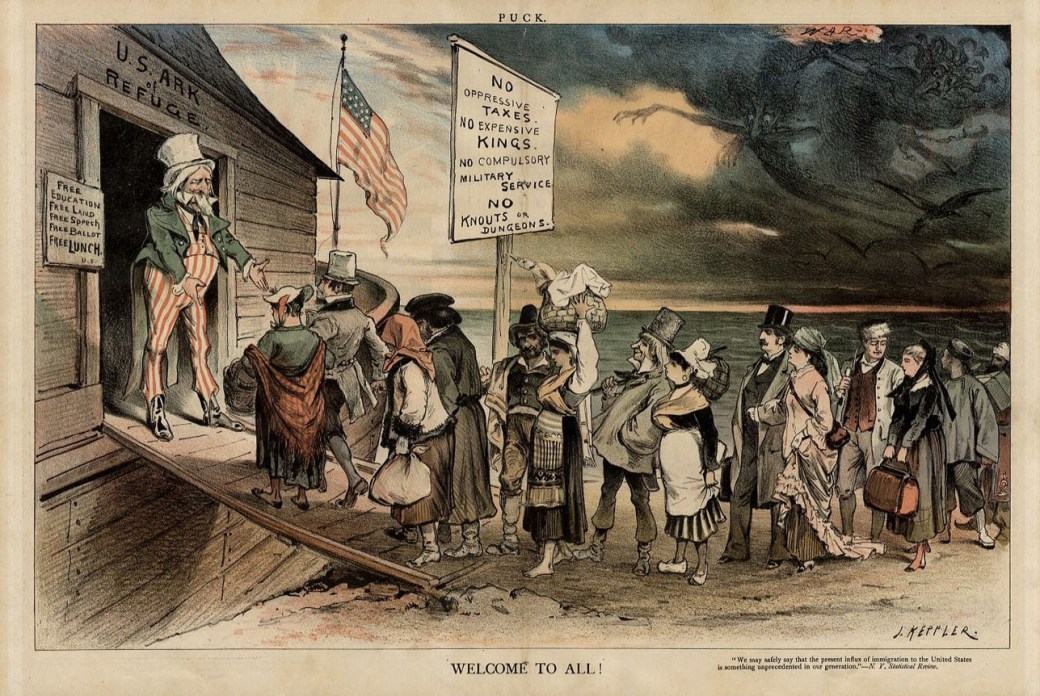
According to political philosopher Sarah Fine (see also here), restrictions on international migration are difficult to justify on democratic grounds. Her argument, as I understand it, goes something like this.
1. To exclude a person from immigrating is to govern them.
2. Excluded migrants do not have a say over the policies that exclude them.
3. Excluded migrants are governed without having a say in how they are governed. (from 1 & 2)
4. Government authority is legitimate only when it is exercised over people who have a say in how they are governed.
5. Governments may not legitimately exercise their authority to exclude migrants. (from 3 & 4)
While I share Fine’s skepticism about the right of states to exclude migrants, I worry that this argument has the seemingly perverse consequence of justifying internal restrictions on migration even as it rules out restrictions on international migration. Why? Consider this alternative formulation.
6. A government is legitimate if and only if the people over whom that government exercises authority have a say in how they are governed.
7. Exclusion involves governing the excluded.
8. A government must either (option A) give the excluded a say in the policies that result in their exclusion or (option B) it must stop excluding people. (from 6 & 7)
9. Option A is impractical with respect to international migrants.
10. Therefore governments must adopt Option B with respect to international migrants. (from 8 & 9)
A problem with this argument, as I see it, is that option A is not impractical with respect to internal migrants. Canada, for example, is a democracy. If Canada were to adopt internal migration controls, then, people who wish to move about within Canada would have a say in the policies that restrict their ability to do so. This means that imposing internal migration controls would count as a legitimate use of government authority, by the criterion spelled out in premise 6. As it happens, internal migration controls are forbidden by the Charter of Rights and Freedoms. But Fine’s view implies that this is purely a matter of constitutional law, not moral right or political justice—there are no normative grounds for including mobility rights in the Charter, or for states that are not bound by any similar documents to respect internal mobility rights. I find this difficult to believe.
One might object that Fine is not assuming a criterion of legitimacy anywhere near as weak as the one in premise 6. No one who embraces liberal democracy would accept the people having a say as a sufficient condition of legitimacy. And if having a say is not a sufficient condition for legitimacy, then the permissibility of internal migration controls would no longer follow from the fact that the people on whom those controls are imposed have a say in how they are governed.
But it seems to me that the ostensible advantage of Fine’s democratic argument is precisely that it yields a strong conclusion (states may not exclude migrants) with an especially weak assumption about the constraints governments must operate within. By comparison, other arguments for open borders (or at least a presumption against the right to exclude) must depend on much stronger and hence more controversial claims about human rights, the nature of justice, the conditions of legitimacy, and the relative moral standing of “insiders” and “outsiders”, whereas Fine’s argument, if successful, would command the assent of anyone who accepts a basic precept of democracy—whatever else they may disagree about.
If Fine’s criterion of legitimacy is interpreted merely as a necessary but not sufficient condition of legitimacy, however, her argument loses this advantage. As soon as it’s suggested that internal migration controls might be permissible on democratic grounds, Fine could add that the right to move about freely within the borders of a country where one has a say in how they are governed is a further necessary condition for legitimacy. But this would make her democratic argument dependent on stronger and hence more controversial claims about humans rights, etc. after all.
Separately, I wonder how plausible it is that giving people a say is even a necessary condition. While there is certainly some relationship between the status of being governed by a given entity and the right to a say in how one is governed by that entity, it’s not clear to me that the latter always follows from the former. I think permanent residents and even temporary workers ought to have the ability to vote in at least some elections, but it’s hard to believe this is true of tourists—even though tourists are also being governed. If tourists don’t have the right to a say, then being governed is not a sufficient condition for having a right to a say, and giving all of the governed a say is not a necessary condition for legitimacy, so Fine’s argument would fail.
A saving move might be to say that although giving the governed a say is necessary for legitimacy, the governed may have their say indirectly, through their own governments and those governments’ participation in processes and institutions of international governance. This might salvage the plausibility of the claim that giving people a say is a necessary condition for legitimacy, but it’s not at all clear to me how it would, on its own, establish a general presumption against the right to exclude. Migrants from countries that satisfy a minimum standard of democracy would have their indirect say in how they’re governed by the destination country, and so it would be permissible to exclude them or deny them voting rights during their stay. On the other hand, migrants from non-democracies could not be excluded, and would have to be granted voting rights during their stay. Although this conclusion has some appeal, especially if we believe that the global migration regime ought to be ordered to prioritize the interests of the poor and oppressed, it does not amount to a prescription for open borders.